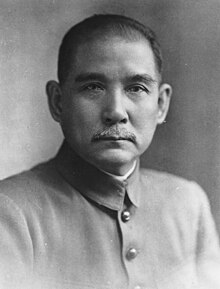
Back Sun Yat-sen Afrikaans Sun Yat-sen ALS ሱን ያት ሰን Amharic Sun Yat-sen AN سون يات سين Arabic سون يات سين ARZ Sun Yat-sen AST Sun Yat-sen Aymara Sun Yatsen Azerbaijani سون یات سن AZB
Sun Yat-sen[a] (traditional Chinese: 孫中山; simplified Chinese: 孙中山; pinyin: Sūn Zhōngshān, /ˈsʌn ˌjætˈsɛn/,[b] 12 November 1866 – 12 March 1925)[2][3][4] was a Chinese revolutionary statesman, physician, and political philosopher who served as the first provisional president of the Republic of China and the first leader of the Kuomintang. He is called the "Father of the Nation" in the present-day Republic of China (Taiwan) and the "Forerunner of the Revolution" in the People's Republic of China for his instrumental role in the overthrowing of the Qing dynasty during the 1911 Revolution. Sun is unique among 20th-century Chinese leaders for being widely revered by both the Communist Party in Mainland China and the Kuomintang in Taiwan.[5]
Educated overseas, Sun is considered to be one of the greatest and most important leaders of modern China, but his political life was one of constant struggle and frequent exile. After the success of the revolution in 1911, he quickly resigned as president of the newly founded Republic of China and relinquished the position to Yuan Shikai. He soon went to exile in Japan for safety but returned to form and found a revolutionary government in Southern China, as a challenge to the warlords who controlled much of the nation. In 1923, he invited representatives of the Communist International to Canton (Guangzhou) to reorganize his party and formed a brittle alliance with the Chinese Communist Party. He did not live to see his party unify the country under his successor, Chiang Kai-shek, in the Northern Expedition. He died in Beijing of gallbladder cancer in 1925.[6]
Sun's chief legacy is his political philosophy known as the Three Principles of the People: Mínzú (民族主義; Mínzúzhǔyì) or nationalism (independence from foreign domination), Mínquán (民權主義; Mínquánzhǔyì) or "rights of the people" (also translated as "democracy"), and Mínshēng (民生主義; Mínshēngzhǔyì) or people's livelihood (sometimes translated as "communitarianism" or "welfarism").[7][8][9]
- ^ "中國國民黨大事記". 中國國民黨全球資訊網 [KMT Global Info Web] (in Chinese (Taiwan)). Archived from the original on 2 August 2009. Retrieved 26 July 2009.
- ^ Steinberg, Jessica (10 February 2021). "China's century-old support for Zionism surfaces in letter". The Times of Israel. Retrieved 11 August 2022.
- ^ Singtao daily. Saturday edition. 23 October 2010. 特別策劃 section A18. Sun Yat-sen Xinhai revolution 100th anniversary edition 民國之父.
- ^ "Chronology of Dr. Sun Yat-sen". National Dr. Sun Yat-sen Memorial Hall. Archived from the original on 16 April 2014. Retrieved 12 March 2014.
- ^ Cite error: The named reference
Tung1was invoked but never defined (see the help page). - ^ Barth, Rolf F.; Chen, Jie (2 September 2016). "What did Sun Yat-sen really die of? A re-assessment of his illness and the cause of his death". Chinese Journal of Cancer. 35 (1): 81. doi:10.1186/s40880-016-0144-9. PMC 5009495. PMID 27586157.
- ^ "Three Principles of the People". Encyclopedia Britannica. Retrieved 15 May 2017.
- ^ Schoppa, Keith R. (2000). The Columbia Guide to Modern Chinese History. Columbia university press. ISBN 978-0231500371. pp. 73, 165, 186.
- ^ Sun, Yat-sen (3 August 1924). "三民主義:民生主義 第一講 [Three Principles of the People: People's living, Lecture 1]". 《國父全集》 [Complete collection of the National Father's scripts] (in Traditional Chinese). pp. 0129–0145. Retrieved 30 December 2019 – via 中山學術資料庫系統.
我們國民黨提倡民生主義,已經有了二十多年,不講社會主義,祇講民生主義。社會主義和民生主義的範圍是甚麼關係呢?近來美國有一位馬克思的信徒威廉氏,深究馬克思的主義,見得自己同門互相紛爭,一定是馬克思學說還有不充分的地方,所以他便發表意見,說馬克思以物質為歷史的重心是不對的,社會問題才是歷史的重心;而社會問題中又以生存為重心,那才是合理。民生問題就是生存問題......
Cite error: There are <ref group=lower-alpha> tags or {{efn}} templates on this page, but the references will not show without a {{reflist|group=lower-alpha}} template or {{notelist}} template (see the help page).
© MMXXIII Rich X Search. We shall prevail. All rights reserved. Rich X Search

